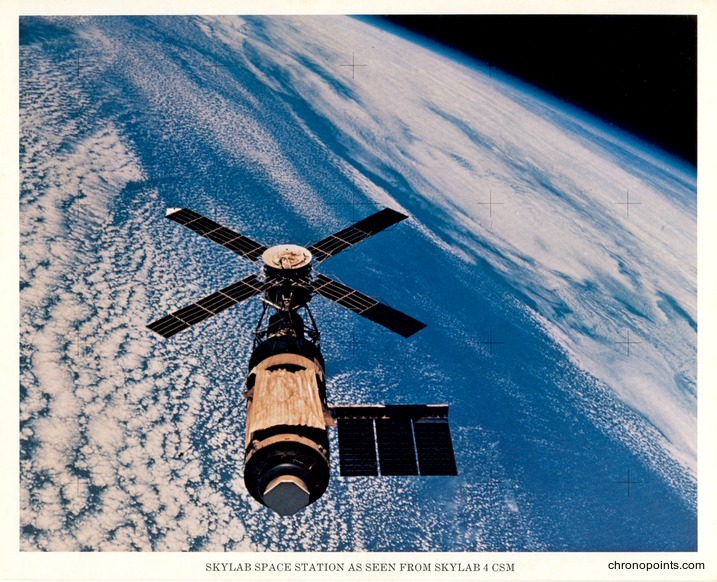Skylab Space Station as Seen From Skylab 4 CSM
Dublin Core
Title
Skylab Space Station as Seen From Skylab 4 CSM
Alternative Title
Skylab Space Station
Subject
National Aeronautics and Space Administration (U.S.)
NASA
Skylab Program
Description
A view of the Skylab Space Station from the Skylab 4 (SL-4) Command/Service Module (CSM). As Project Apollo was winding down and the final three missions (Apollo 18, Apollo 19, and Apollo 20) were canceled, the National Aeronautics and Space Administration (NASA) looked for ways to repurpose launch vehicles and other equipment. Out of this, Skylab and three space science missions were born. Skylab was conceived by famed rocket designer, Wernher von Braun (1912-1977), to use an unused upper-stage fuel tank and convert it to an orbital laboratory. This was necessitated by NASA's budget being slashed. With the tank becoming the basis of the space station, NASA added solar arrays, a docking adapter, and a space observatory. The Skylab missions were constituted of one mission to put the station in space (Skylab 1), using a modified and last Saturn V to launch, and three crewed missions (Skylab 2, Skylab 3, and Skylab 4) to occupy the lab and perform science, using the smaller Saturn IB booster to launch the three astronaut crews. When launched on May 14, 1973, the station encountered problems immediately. A micrometeoroid shield prematurely deployed and tore off one of the two main solar arrays. NASA engineers went to work and were able to save Skylab and the three crewed missions. Each of the subsequent missions set what were then endurance records for living in space and conducted substantial space science experiments. NASA tried to keep Skylab in orbit after Skylab 4 (SL-4) and until the Space Shuttle could boast its orbit, but with a decaying orbit, it crashed on July 11, 1979.
Source
Original color photographic print: Leonard Pugh Collection.
Date Created
ca. 1973
Contributor
Is Format Of
Digital reproduction of original color photographic print.
Is Part Of
Florida Space Coast History Collection, RICHES of Central Florida.
Format
image/jpg
Extent
169 KB
Medium
1 color photographic print
Language
eng
Type
Still Image
Coverage
Launch Pad 39B, John F. Kennedy Space Center, Merritt Island, Florida
Spatial Coverage
John F. Kennedy Space Center, Merritt Island, Florida\28.579393\-80.649316\1973-01-01\1973-12-31
Launch Pad 39B, John F. Kennedy Space Center, Merritt Island, Florida\28.627329\-80.620871\1973-01-01\1973-12-31
Accrual Method
Donation
Mediator
History Teacher
Civics/Government Teacher
Geography Teacher
Rights Holder
Copyright to this resource is held by Leonard Pugh and is provided here by RICHES of Central Florida for educational purposes only.
Contributing Project
Curator
Michlowitz, Robert
Cepero, Laura
Digital Collection
External Reference
"Skylab, Birth of the Modern Space Station: Part I - The History of Sky | NASA." National Aeronautics and Space Administration. Accessed August 12. http://www.nasa.gov/missions/shuttle/f_skylab1.html.
"Skylab, Our First Space Station - ch2." 2015. SP-400 NASA - Skylab, Our First Space Station. Accessed September 25. http://history.nasa.gov/SP-400/ch2.htm.
Howell, Elizabeth. 2013. "Skylab: First U.S. Space Station." Space.com. February 1. http://www.space.com/19607-skylab.html.
Collection
Citation
“Skylab Space Station as Seen From Skylab 4 CSM,” RICHES, accessed February 17, 2026, https://richesmi.cah.ucf.edu/omeka/items/show/5896.
